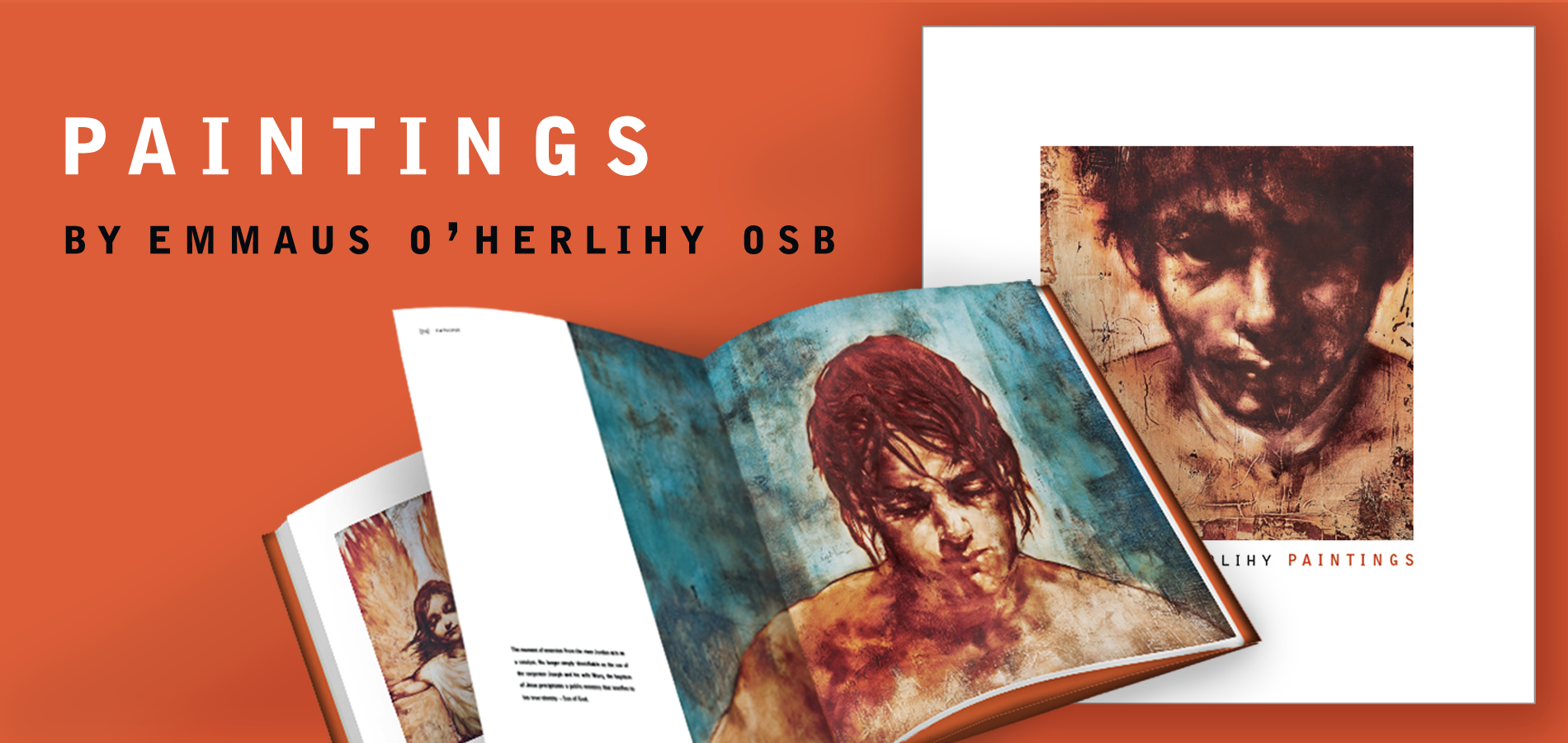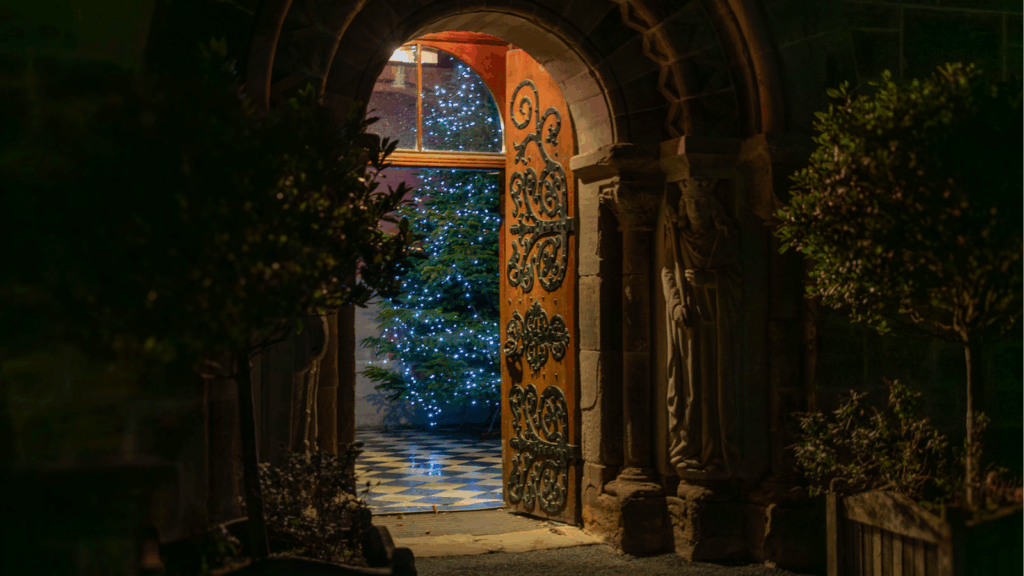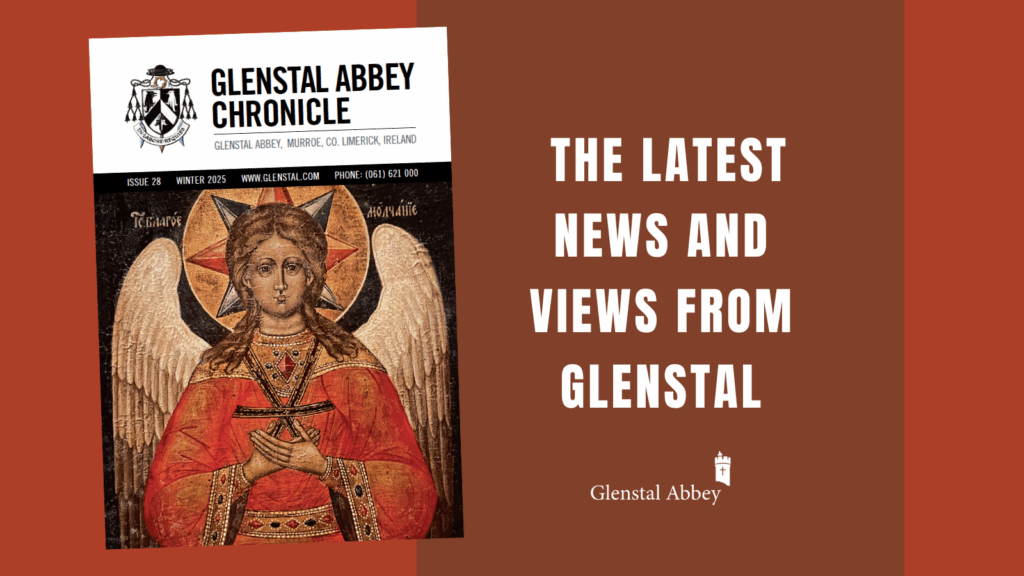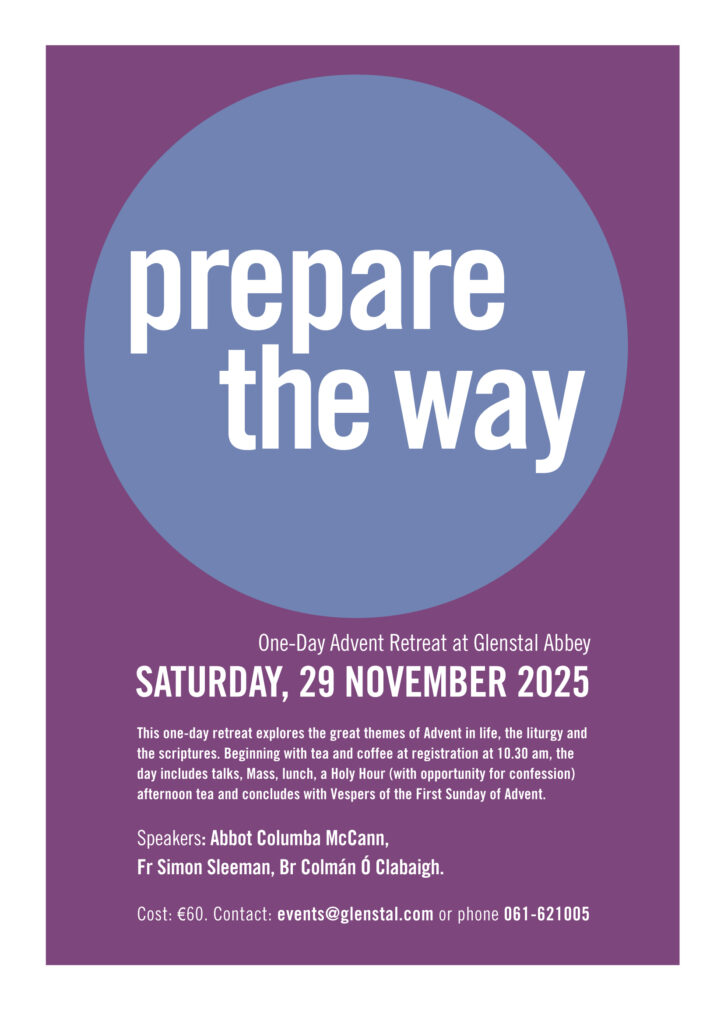


Extract from the Annals of Glenstal Priory for 18th and 19thDecember, 1927:
‘He [Father Superior, Dom Gérard François] came back [from Belgium] during the night before December 18th. The next day, it being a Sunday, the six members of the new foundation being assembled in Sir Charles Barrington’s former smoking-room, at the bottom of the main staircase, Dom Gérard declared that the Lord Abbot of Maredsous and the Lord Abbot President of the Belgian Congregation had delegated him to erect canonically the new priory. Consequently, the regular community-life was to start this afternoon.
From the next morning onwards, Matins were said in choir at 5.20 in the morning – one hour later than in Belgium. In that first community conference, Father Prior pointed out that our work was going to be a long an arduous one; and that we were not likely to reap ourselves the full fruit of the seeds we were sowing…’

CHRISTMAS LITURGY TIMES/OPENING HOURS
Wednesday 24th December (Christmas Eve)
6 pm – Vespers I
11.20 pm – Vigil followed by Midnight Mass
Thursday 25th December (Christmas Day)
8 am – Solemn Lauds
10 am – Morning Mass (no music)
12 noon – Solemn Conventual Mass
5 pm – Vespers II
Friday 26th December (Feast of Saint Stephen)
7 am – Matins and Lauds
12.10 pm – Mass
6 pm – Vespers
Saturday 27th December (Feast of Saint John the Apostle and Evangelist)
7 am – Matins and Lauds
12.10 pm – Mass
6 pm – Vespers I of the Holy Family
8.35 pm – Vigil
Sunday 28th December (Feast of the Holy Family)
7 am – Lauds
10 am – Mass
12.35 pm – Sext
6 pm – Vespers II
8.35 pm – Compline
Monday 29th December (5th Day in the Octave of Christmas)
7 am – Matins and Lauds
12.10 pm – Mass
6 pm – Vespers
8.35 pm – Compline
Tuesday 30th December (6th Day in the Octave of Christmas)
7 am – Matins and Lauds
12.10 pm – Mass
6 pm – Vespers
8.35 pm – Compline
Wednesday 31st December (7th Day in the Octave of Christmas/New Year’s Eve)
7 am – Matins and Lauds
12.10 pm – Mass
6 pm – Vespers
8.10 pm – Vigil
Thursday 1st January 2026 (Solemnity of Mary, Mother of God)
7 am – Lauds
12.10 pm – Mass
6 pm – Vespers
8.35 pm – Compline
The normal liturgical time resumes from Friday 2nd January 2026.
Confessions
A priest will be available on Christmas Eve from 2pm – 5pm in the Abbey Church.
Guesthouse
Closes on Sunday 21st December and reopens to guests on Monday 29th December.
Monastery Reception and Shop
The following are the opening hours of the reception and monastery shop from Monday 22nd December to New Year’s Day.
Monday 22nd – Wednesday 24th December: 10am – 2pm
25th, 26th, 27th, 28th December: CLOSED
Monday 29th – Wednesday 31st December: 11am – 4pm
Thursday 1st January: CLOSED
Friday 2nd January return to normal working hours of 9am – 5pm.

The Winter 2025 edition of the Glenstal Abbey Chronicle has been published, and is now available to read on the website here.
Fr Henry O’Shea:
Abroad the royal banners fly,
now shines the Cross’s mystery:
upon it Life did death endure,
and yet by death did life procure.
These lines are taken from one of the most beautiful hymns of the liturgy, the Vexilla Regis or The Banners of the King. This hymn is sung during the monks’ evening prayer in the last two weeks of Lent. Sung in Latin to a plaintive, haunting, melody, the hymn reaches a dramatic climax in the lines,
Hail Cross, of hopes the most sublime, Now and in the end of time…
The monks kneel in their places for these lines.
The fact that the hymn is sung in the run-up to the three days of Easter underlines the reality that Easter is the main feast of Christ the King, the great feast from which all others flow, the great feast from which all others get their meaning.
Why then, do we celebrate another feast of Christ the King as the Church’s year enters its last week?
When we think about it at all, we probably consider monarchy a thing of the past. Here in Europe, the surviving monarchies – with the exception of the Vatican – are constitutional monarchies, essentially ceremonial and toothless. But the reality of monarchy remains, and not only in the absolute or quasi-absolute monarchies of which there still are several in the world. Actual, effective monarchy, even if not officially so designated, flourishes in what are and have ever been the predatory empires that have always existed and are, once more, unblushingly, showing their teeth and their grasping winner-takes-all claws.
Nor do contemporary empires always have to be official states. Global corporations are frequently limitless in their resources and untrammelled in their exploitative, imperialistic, greed and ruthlessness.
It is true that from at least the fourth century, it was usual to refer to Christ as King/Rex and even Emperor/Imperator. But today’s feast of Christ the King is a very modern feast. To understand its origin, we need to cast our minds back to 1925. In that year, it seemed to the Pope of the time, Pius XI, that in the face of three ideologies or political and economic systems, it was necessary to remind the world of where true and ultimate power lay, of where true and ultimate power lies.
Remember that in 1925, the Fascist regime in Italy, though only three years in power, was revealing its true colours. Hitler’s perfection of the fascist model was still eight years in the future. In 1925, it looked as if uncontrolled capitalism of the American variety with its adoration of the golden calf of individual greed and socially irresponsible accumulation was going to sweep all before it – at least outside the Soviet Union.
This was only four years before the crash of 1929 caused the sobering cold shower of the Great Depression. In 1925, the Soviet Union was getting into its godless stride. To some naive commentators in the West and elsewhere, it was the future that was already working. Think of George Bernard Shaw. In the end, the Soviet vision of a humanly perfectible humanity would lead, until its collapse in 1989, to the death of an estimated 65 million individual human beings in that empire alone. And this is a conservative estimate.
Even if Pius XI was still bound by the language of monarchy and proposed Christ as the King of the Universe, his insight into the potential and ultimately realized disasters of the three ideologies we have just mentioned was prophetic. And, since at least the 1980s, but more obviously since 2000, it has become clear that not only has history not ended, but nothing has really changed. Force, violence, greed and disregard for human life and human rights are once more centre-stage. Just turn on the news.
The preface of today’s Mass sums up what this feast is all about. It expresses concisely what kind of kingdom Pius XI had in mind: a kingdom of truth and life, a kingdom of holiness and grace, a kingdom of justice, love and peace. It is distinctly possible, even likely, that these ideals of truth and life, of holiness and grace, of justice, love and peace will always remain that, ideals, but they will always be ideals worth striving for.
Today’s readings talk about the one who makes belief in these ideals possible, who helps us to make these ideal realizable, who promises us that these ideals will eventually triumph.
The Jesus we hear about in today’s readings has none of the attributes we associate with kingship, either inherited or elected. He has none of the refined splendour of contemporary and mostly politically emasculated constitutional monarchs. Nor has he the smug air of entitlement or vulgar brashness of the elected or unelected monarchs of our powerful republics.
What he does have in common with certain hereditary monarchs is lineage.
The first reading tells us that Jesus is of the house of David. David, the anointed king of Israel, who despite his many human flaws, united all the tribes of Israel. The tribes said to him, ‘Look. We are your own flesh and blood…to whom the Lord has said, “You are the man who shall be shepherd of my people Israel, you shall be the leader of Israel.”’ It is this Jesus who is the leader of the new Israel, that is, of the whole of redeemed humanity. It is he who has made us his own flesh and blood, made us members of himself and, with that, members of each other.
In the second reading from the letter to the Colossians, St Paul describes what God has done for us in Jesus Christ: ‘..he has taken us out of the power of darkness and created a place for us in the kingdom of the Son that he loves, and in him we gain our freedom, the forgiveness of our sins.’ St Paul then goes on to give a marvellously poetic and theological description of who and what Jesus Christ was and is: ‘…before anything was created he existed, and he holds all things in unity. Now the Church is his body, he is its head.’ Through Baptism, we belong to that body and belong to one another. He is our head – a monarch, perhaps yes, but of a kingdom where all are equal, a kingdom without any claim to confer nobility except that of being part of Jesus.
There is nothing at all regal about the gospel reading, this year from the evangelist Luke. Stripped and crucified, Jesus on the Cross is exposed to the ridicule of the powerful and of their hangers-on, exposed to the despair and disappointment of those who loved and believed in him, or in what they imagined him to be. And also present are the perplexed, if even still grimly and dimly hopeful, family and few disciples who cling to what remains of him. And then there comes in the very final sentence of today’s gospel, one of the most kingly, most majestic, most power-filled and simple statements of Jesus, ‘today you will be with me in paradise.’
Many monarchs can promise this, but only one can make it real. Only this monarch can relativize all earthly power and make the cross a throne.
That which the prophet-king of old
hath in mysterious verse foretold,
is now accomplished, whilst we see
God rule the nations from a Tree.
Hail Cross, of hopes the most sublime!
Now and in the end of time;
grant to the just increase of grace,
and every sinner’s crimes efface.
Fr. Mark Patrick Hederman: We have to be careful not to create a wrong impression on a day like today. Some interpretations of the Gospel might suggest that Poverty is good and wealth is bad. Nothing could be further from the truth. Riches are not evil and being poor is not a blessing. Poverty is one of the greatest blemishes on our common duty to create a liveable home for all 8.2 billion people on this planet at this time. There is nothing whatever to recommend poverty in itself as a way of life. Poverty in itself is actually a disgrace. It has become one of the most urgent challenges of our time. Today, almost 700 million people, that is 8.5 percent of the global population,live in extreme poverty. This should not be the case. The United Nations Summit in New York in 2015 vowed to end extreme poverty altogether by the year 2030, that is five years from now. There is certainly enough wealth being generated to make this happen. But it is not going to happen. Why not? Because of the age old struggle between basic needs and excessive consumption. Global hunger isn’t about a lack of food. Right now, the world produces enough food to nourish every human being alive. But the sad fact is that one-fifth of all the food produced is lost or wasted. We throw away, according to statistical analysis, at least a billion meals every day.
People who are poor have every right to expect more from the rest of us. Extreme poverty is not a blessing, it is an entirely remediable blemish.
What Jesus Christ has said about poverty is this: ‘Blessed are the poor in Spirit.’ This is quite a different reality. There is nothing wrong or evil about being rich. It is how you use those riches that makes them good or bad. ‘It is easier for a camel to pass through the eye of a needle than for someone who is rich to enter the kingdom of God” [Mark 10:25]. Why is this so? Because of the cancer of greed. Greed, as the root of all evil, is what we all suffer from in one way or another. Every one of us knows the symptoms: We can never have enough, we always want more.
Two days before Christmas, on the 23rd December, 1849, one of the greatest writers of all time, Fyodor Dostoyevsky, who was in his late twenties, stood against a wall in Saint Petersburg in Russia. It was early morning and he was awaiting execution by firing squad. He had been condemned to death for subversive activity. He was counting the buttons on one of the soldier’s uniforms as that soldier raised his rifle. Suddenly a horse gallops into the yard; the rider is carrying a last minute reprieve from the Czar. The young man falls to his knees and vows to live every moment of the rest of his life with the same fullness and intensity of those final seconds before he was shot. That was the beginning of what later became known as ‘Existentialism.’Living every moment of your life as though it might be your last. When you get up in the morning and put your two feet out on the floor, are you aware that every move you make, every breath you take, is a gift from elsewhere. It’s not your doing. You are nothing, and you can do nothing on your own. Everything you are, and everything you have, come from elsewhere. You are a nobody, a pauper, a beggar. Those two feet that touch the ground are the only two you’ve got. No matter how much you yearn for the most fashionable shoes on the market, you can only put one shoe on each foot at a time. That’s the way we are, the way we were built, and we just have to get on with it. Being ‘poor in spirit’ is knowing the facts of life, recognizing our existential poverty and accepting this as a foregone conclusion, a done deal. Greed is refusal to accept such poverty. Mahatma Ghandi spoke for all of us when he said: ‘the world has enough resources for everyone’s need but not enough for everyone’s greed.’ If current trends continue, 8.9 per cent of the world’s population will still live in extreme poverty by the time we reach 2030. Imelda Marcos, when forced to flee The Philippines with her husband in 1986, left behind her, in the presidential palace, 2,700 pairs of shoes.

Fr. Christopher Dillon OSB: The Church is celebrating today the dedication of the mother of all the Christian churches in the world, the Lateran Basilica, which was built by the Emperor Constantine in about 324. And we mark the feast, particularly, because it celebrates the extraordinary teaching about the presence of God among us and the several ways in which God is among us and even within us.
In the early days of Israel, God was believed to be present in some way with the Hebrew people in the tent they kept for Him which they carried with them in the desert; and then, subsequently, in the Temple which Solomon built in Jerusalem.
But then Jesus Christ came on the scene and declared that in some strange way, he was the real temple which God occupies. Indeed, the Gospel text which we have just heard has Jesus state specifically that his resurrected body is the true sanctuary of God’s presence. And, so it is that we, by virtue of our Baptism, we are each counted as stones making up that building, that temple, with Jesus Christ as its cornerstone, holding it all together.
What does all this mean? God is Spirit, so how can God be said to live in any particular place? God is everywhere. God is in you and in me, we are told.
Jesus tells us that where two or three of us believers are gathered together in his name, he is there with us. So, in that sense, God is here among us as we are gathered here and now. So it is that we dare to call even this building a House of God. But as we do so, we acknowledge that that church in Rome, the Lateran Basilica, built in 324, is more especially the House God, because Rome became special with Ss. Peter and Paul and its many Christian martyrs and that is where the Pope is properly bishop of Rome.
After all that, I want to say something about the notion of each of us, individually, as stones built into God’s House. You will have noticed the work being carried out on the castle, over the past months and years, and the care and the skill with which individual stones have been repaired or replaced. Something of the same has to be done with you and me, as we make our way through life. We are being chiselled, shaped and polished by the events of our lives, sometimes painfully, in order to make us fit into our place in the building which is God’s House. That is why, as St Paul has just reminded us, we must have due regard for one another; for together, we make up God’s house. Indeed, I might add, we should be similarly respectful of God’s presence here, so that, when the liturgy is finished, we maintain a respectful silence until we are outside, rather than chatting to one another as though we were just anywhere.
In our ordinary, everyday lives, we may have little or no awareness of God’s presence, but this building and thousands of others like it, beginning with that church in Rome, are designed to remind us of the great reality of God’s presence among us and of our place in that reality. Let us reflect with gratitude on what that means and how it should affect the way we live.
Abbot Columba McCann: I remember, thirty years ago, taking the train for about half an hour from Rome to the ancient, ruined port of Ostia Antiqua. Silted up for centuries, much of the ancient buildings were by a curious twist of history preserved until, in the twentieth century, the marshland in which they were submerged was drained. Among the ruins I spotted a plaque on the wall of a half ruined house. It told the story of St Augustine, the man from Africa, and his last conversation with his mother as he prepared to return home. She was facing into the journey towards her eternal home. When the question of her burial came up, she basically said, ‘Bury my body wherever you like, it doesn’t matter. But do remember me when offering Mass.’
Today we remember, at Mass, all our loved ones who have died and more again, all the faithful departed.
When someone close to us has died it is good to remember the different ways in which they gifted us. We can remember, re-live, what we received. We benefit all over again. We can thank them and thank God.
There may have been some ways in which we were able to help them in return on their life’s journey. When someone close to us has died it can help to give thanks to God for the ways in which we were able to give them a gift or two along the way.
There may have been ways in which they fell short in their dealings with us. When someone close to us has died it is good to seek forgiveness for them: forgiveness in my own heart (not always so easy) and God’s forgiveness, which is greater than we can imagine.
There may have been ways in which we ourselves fell short in our dealings with them. When someone close to us has died it’s good to say sorry to them and sorry to God.
Remembering those who have died is a good thing. Remembering them with God brings it further – remembering them while God holds our hand, so to speak. Then as we speak our story we can hand it over to the source of all life. Remembering them as we give thanks for gifts given and received, remembering them as we forgive and ask for forgiveness, all within God’s hands.
When we look at today’s gospel we see what happens when that kind of encounter happens. There is the sad procession out of the town: a widow and her neighbours heading out to bury her only son. He was all she had, her last protector and insurance for the future. But coming from the opposite direction is Jesus and his disciples. And they meet. Death meets life, and everything changes.
Remembering the dead can bring with it a bittersweet mixture of gratitude and sorrow, acceptance and regret. But if we meet Christ in the process, everything there can become a bearer of life.

I have always liked – but for no morbid reason – the month of November, a month when the turning of the seasons mirrors the cycle of life and death. There is something about the days growing shorter and nature itself dying back into winter that connects in my being. For our Celtic forbears this was a liminal time, Samhain, when the veil between worlds became more transparent and the connectedness of both worlds became present. In all of this, nature herself calls us to remember those gone before us. The month is laced with ritual, beginning on All Hallows’ Eve, to the great interwoven feasts of All Saints on the 1st November and All Souls on the 2nd November, days of remembrance and remembering. These feasts, rooted in time and tradition, connect, celebrate and offer prayers for the departed as expressions of hope in the resurrection and eternal life.
The practice of commemorating the dead finds deep resonance in our Benedictine tradition. At the Abbey of Cluny in medieval France – one of the most influential monastic centres in Europe – the remembrance of the dead was woven into the very fabric of daily life. Founded in 910, Cluny became renowned for its spirituality, liturgy, learning, and architecture, but also for its spiritual concern for the souls of the departed. The Cluniac monks introduced the practice of offering regular Masses and prayers for the dead, formalising what would become the Feast of All Souls. This innovation spread throughout Christendom, shaping how generations of Christians would remember their ancestors and loved ones. This emphasis on remembrance was an act of profound faith in the communion of saints, a belief that we, the living, remain united with our dead in Christ through prayer and love. This in essence is what we remember during this month of November.
As in all parishes, this tradition finds quiet continuation here at the abbey in Glenstal. Woven through the monastic rhythm of prayer, reflection and work, is this thread of remembrance. Each day, at the conclusion of the various hours we pray ‘May the souls of the faithful departed through the mercy of God rest in peace’. In particular, at Midday Prayer on Sunday, we commemorate all our deceased brethren, relatives, friends, and benefactors as we chant;
‘With your holy ones, O Christ,
give rest to all your servants in a place of peace,
where there is neither pain nor sorrow but joy in everlasting life. Alleluia!’
Rather than a place of desolation, the cemetery here becomes a witness to continuity; between life and death, between past and present, between earth and heaven. The autumnal dying light, the rustling leaves, and the scent of damp soil all seem to join in the liturgy of remembrance. In this setting, history breathes gently and memory is renewed through the quiet chant of the monks.
Thus, for a Christian, November’s commemoration is not nostalgia; it is an act of faith and love. To remember our dead, ‘those gone before us marked with the sign of faith’, is to affirm that life transcends mortality; that those gone before us remain part of us, part of our spiritual family, as one day will we for those left after us. Remembrance is a sacred bridge between them and us, between here and there, between time and eternity.
May their souls and the souls of all the faithful departed,
through the mercy of God rest in peace. Amen
Pádraig McIntyre OSB